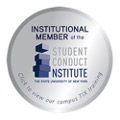The Office of Student Conduct and Community encourages faculty staff and students to participate in the student conduct process in the following ways:
Advisor is any individual who provides the victim/survivor/complainant or the accused/respondent with support, guidance, and/or advice. Both parties are permitted one advisor of their choosing to accompany them and assist them throughout the investigation and conduct process. An advisor may be a friend, parent, faculty, mentor, attorney, or any person they wish. In general, the advisor will not be permitted to speak for the student in the process or to have any role in the process other than to advise and assist them. Advisors for students in the Title IX Grievance Process will conduct cross examination in the hearing on behalf of the advisee. This is volunteer position and time commitment may vary.
Student Conduct Hearing Officers are persons who hear student conduct referrals, including alleged violations of academic dishonesty. This body consists of one student and two faculty and staff members. The Hearing Board can impose any of the sanctions set forth in the Student Code of Conduct (Student Community Rights and Responsibilities). Decisions are made by a simple majority. Hearing Boards generally hear high level or repeated offenses for which a more severe sanction might be imposed. Hearing Officers also may serve on Appeal Boards to review outcomes of student conduct hearings. This is volunteer position and time commitment may vary. Service on any particular board is based on one's availability.
Eligibility for student members of Student Conduct Hearing Boards:
- Student Board members must be in good academic and conduct standing (i.e., not on probation or higher).
- A general willingness to serve on any scheduled board hearing, regardless of the nature of the incident or the specific charges filed.
- A strict adherence to impartiality, objectivity, punctuality, civility, and confidentiality.
- Must possess a high attention to detail, effective communication skills, and critical thinking skill
- Must complete 8 hours of training annually
View Interest Form for Student Members of the Student Conduct Hearing Boards
Faculty or staff members interested in serving either as advisors or hearing board members should contact the conduct office.
Training Student Conduct Hearing Board Members and Advisors
 To serve as a Hearing Officer or Advisor in a Title IX Grievance Procedure requires specialized training which is offered through the SUNY Student Conduct Institute (SUNY SCI). This training includes topics such as how to serve impartially, issues of relevance, including how to apply the rape shield protections provided for complainants, and any technology to be used at the hearing. To view the training materials used in this training, please link to the SCI Training Site.
To serve as a Hearing Officer or Advisor in a Title IX Grievance Procedure requires specialized training which is offered through the SUNY Student Conduct Institute (SUNY SCI). This training includes topics such as how to serve impartially, issues of relevance, including how to apply the rape shield protections provided for complainants, and any technology to be used at the hearing. To view the training materials used in this training, please link to the SCI Training Site.
Training is provided by the SUNY Student Conduct Institute.
